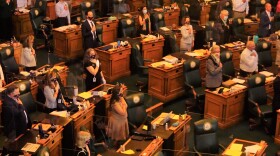Gov. Jared Polis on Monday signed what he is calling is the most difficult budget in state history because of the impacts of COVID-19.
There were no large banners celebrating legislative accomplishments like there were last year.
And when the lean budget goes into effect July 1, Colorado's public schools will take one of the biggest hits, with more than $500 million missing from their budgets.
Steamboat Springs School District Superintendent Brad Meeks says his district in Northwest Colorado expects a $1.7 million shortfall next year. It represents a nearly 6% drop in revenue.
"We're not able to purchase curriculum materials. We've had to reassign our instructional coaches," he said last week. "Those are all impactful in the classroom. Maybe not as much professional development. And I think the effect of extracurricular activities. Students can't participate in the activities they love."
Districts like Steamboat are also having to face the cuts at a precarious time, when there are still lots of unanswered questions about the coronavirus. Will there be a second wave in the fall? And what about the safety of students and teachers?
Meeks said a recent survey of parents in the district revealed about 5% of them don't feel safe sending their kids back to the classroom yet. A drop in enrollment could lead to even more budget woes.
"What we're trying to do in the district is ask 'what are the resources we have available to minimize the damage to the classroom and still carry on?'" he said.
Meeks said during the pandemic, the district is seeing lots of support from the community, which helped deliver lunches to students when classrooms were forced to close. He also praised district staff for responding to a crisis that led to school closures within a matter of hours.
For now, Steamboat is proposing to spend about $500,000 of its reserves to spare it from some cuts. But with the deficit so high, their rainy day fund can only go so far. Meeks says the remaining cuts will include about 15 full-time employees.
A tearful proposition
Lawmakers had to remove so much money from the state education budget next year, it brought some of them to tears.
Republican lawmakers were critical of the budget cuts when they were being debated earlier this month.

Democrats defended the spending plan, saying they left education funding as the last item to consider after slashing billions of dollars from all other state departments. Education accounts for about a third of the state's general fund.
"We couldn't not touch education," state Sen. Rachel Zinzinger said in an emotional speech earlier this month. "But we faced the worst budget gap in our state's history, more than any other downturn combined. It was a bad year for everyone. And quite frankly, if we don't work to address the systemic problems we have right now with the way we finance our schools, next year is gonna be a hell of a lot worse."
The federal CARES Act will help soften the blow after Gov. Polis sent more than $500 million of it to K-12 schools.
But education advocates say it's uncertain how far the stimulus money will go, and these money woes are hitting at a particularly worrisome time.
A tough time
Education advocates say school districts are not in a strong position to handle another wave of significant cuts from the coronavirus pandemic.
"We're still digging out of the recession from 2008-2009. We're only halfway back," said Michelle Murphy, the leader of Colorado's Rural Schools Alliance. "So, great concern about what this is going to look going forward. Rural districts are leaner than their larger counterparts so to speak. There's less fat to trim."
State lawmakers did pass a handful of bills to try and fill some of the gaps. Voters will decide in November whether to increase taxes on cigarettes and nicotine products to generate tens of millions of dollars for rural schools' districts. But while grateful, Murphy says the measure is not nearly enough.
"We're talking about hundreds of millions of dollars in cuts, and we really need a sustained revenue stream," she said. "Again, grateful for the additional money in the 12th hour, but it does not begin to solve the problem."
And while districts like Steamboat are dipping into their reserves to avoid more drastic cuts right now, Murphy worries the worst has yet to come if federal aid doesn't continue.
"There's a clear, clear sense that next year is going to be, I'm not going to use the word disaster, but real crisis," she said. "One of my superintendents uses the word collapse repeatedly to talk about next year. If they can get through this year, they can piece it together. But they are concerned about system collapse next year."

And education advocates are also worried that districts, who are already running on lean budgets, would be even more devastated with more cuts than they were in the Great Recession.
Colorado Education Association President Amie Baca-Oehlert said more than half the school districts in the state are running on a four-day week.
"We have students who don't have access to adequate mental health support. We have students sitting in class sizes that are much too large," she said. "We have one of the largest educator shortages we've seen. So, adding to that already devastating picture just doesn't look good, so we're very concerned about that."
Which leaves the future uncertain for Steamboat and 180 other districts around the state as they contemplate budgets - and how they will handle classes in the fall.






